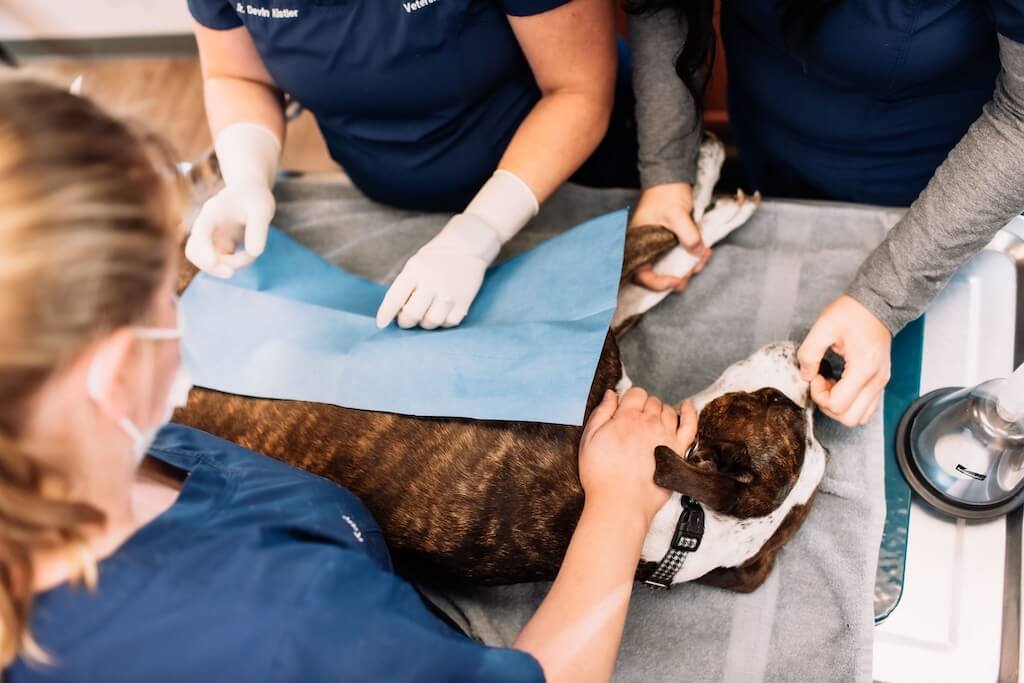Everything You Need To Know About Dog Spaying and Neutering
 What's the difference between dog spaying and neutering?
What's the difference between dog spaying and neutering?
Spaying a dog involves removing the uterus and the ovaries. Neutering a dog, on the other hand, involves removing the testes from the scrotum.
How does dog spaying or neutering impact the health and well-being of my pet?
In most cases, dogs that are intact, meaning that they haven’t been spayed or neutered, are at a higher risk of developing cancer. These cancers include mammary cancer or breast cancer, and cancer of the ovaries or the testicles.
How soon should I bring my pet in to see the veterinarian to get my dog spayed or neutered?
We always recommend bringing in a pet as soon as you get them. This way, we can go over different vaccination protocols and then decide when it might be best to spay or neuter your pet. While we recommend spaying or neutering most dogs around five to six months old, every case is different, and we can discuss that with you at your first exam.
What are some possible conditions that can be helped by spaying or neutering my dog?
Removing the reproductive organs that are not in use can help eliminate or deter any forms of reproductive cancer from happening. It can also prevent female dogs from having a severe infection in the uterus called a pyometra, which is driven by hormones and can only occur when they still have their uterus and ovaries.
What will my veterinarian need to know about my dog before spaying or neutering?
A physical exam ahead of time is very important to make sure that your dog is healthy enough to undergo anesthesia. We’ll also go over previous history and make sure that there aren’t any other concerns or if there’s ever been any issues under anesthesia in the past, we will also discuss those.
How long will it take for my dog to recover from being spayed or neutered?
Most dogs are completely recovered within 10 to 14 days. That’s the time length it takes for those sutures that we put in to start dissolving. We ask that you keep them especially quiet in the first few days after surgery as that’s when most of the cells and everything are being brought to the incision sites to help heal.
What care should I be prepared to provide at home while my dog is recovering from their spay or neuter surgery?
We send home all spays and neuters with an e-collar or the cone of shame to help make sure that they don’t mess with their incision sites. We’ll also ask that you try to keep them as calm as possible. Sometimes we will also include calming medications sent home with you to help make sure that they aren’t too rambunctious when you first get them home.
Is it necessary to spay or neuter my dog?
The short answer is no, your dog does not have to be spayed or neutered. However, it is very strongly recommended for non-breeding dogs as they are at a higher risk of developing infections in their uterus or developing ovarian, mammary or testicular cancer. If you intend to use your dog for breeding purposes, it is advisable to have them fixed as soon as you’re done breeding.
Should my dog have a litter before being spayed?
No, there are no studies suggesting that having a litter of puppies before being spayed has any health benefits for dogs.
My dog urinates all over the house. Will spaying or neutering help?
This is not usually an issue with female dogs. However, male dogs may start marking their territory by spraying, a behavior that can be curbed by neutering them early in life. If the dogs are older, it might require additional behavioral training.
Does spaying or neutering prevent future illnesses?
Yes, spaying or neutering can prevent future illnesses. Dogs that are not spayed or neutered are at a higher risk for developing different reproductive system cancers and infections in the uterus. So, there are definite health benefits to getting your dog spayed or neutered.
Will my veterinarian provide me with post-op instructions?
Certainly. Veterinarians make sure to send home instructions via email, and you will receive the same print-off when you come to pick up your pet. A registered technician will also be available to answer any questions or concerns you might have. They will also go over the discharge papers, explaining what to expect in terms of feeding and caring for your pet’s incision site.
How long will my dog take to recover after being spayed or neutered?
We generally recommend keeping them calm for the first 10 to 14 days. This is the most important healing time.
Will my dog need pain medication at home following the spay or neuter?
Absolutely. Veterinarians always ensure that pets are comfortable after the procedure. They will provide them with appropriate pain medications depending on the procedure they’ve undergone. If you have any concerns about your pet experiencing pain afterwards, it is strongly recommended to give your vet a call.
Will my dog gain weight after a spay or neuter?
This is a common misconception. While we do remove the hormones that usually keep them active, it’s crucial to remember that if your pet is less active than before, you may need to adjust their diet.
Will my dog's personality change after being spayed or neutered?
Generally, no, it does not alter their personality. They may have less urge to seek a mate, but it doesn’t shift their overall behavior.
Will my dog stop running away if I get him neutered?
They will indeed lose the specific urge to seek a mate, so most of the time they will stop running away. However, there could be other reasons why they are escaping from the house, and we may need to consider some other behavioral modifications.
How are dog spays and neuters performed?
A dog spay is performed by making an incision in their belly and then we remove the uterus and ovaries and then we suture their belly back up. For a dog neuter we just remove the testicles and then they also have an incision site as well.
Are there any complications to a spay or neuter surgery?
There can be complications. The number one complication is the dehiscence of the incision site or the sutures coming out of the incision site. This is usually caused by the dog being too active when they first go home. Other complications that can happen are infection at the incision site or infection in the abdomen, which is less likely to happen.
How long does a spay or neuter take?
On average, the typical neuter for a male dog takes 10 minutes or less. As far as spaying a dog, it can be anywhere from 10 to 30 minutes. Sometimes that can depend on the size of the dog.
What are some misconceptions about the spay or neuter process?
There are some common misconceptions that they need for female dogs to have a litter of puppies beforehand. This is not true. There’s no studies that show that there’s any benefit to that. There’s also some of the misconception that they need to have a heat cycle before they’re spayed. There’s no studies that show that this is necessary either. As far as male dogs go, depending on their breed, there are some different ages that we may recommend neutering.
If you still have other questions and you’d like to reach out to us, you can call us directly at (765) 482-7387, or you can email us at [email protected].
But please do reach out, and we’ll get back to you as fast as we can.
